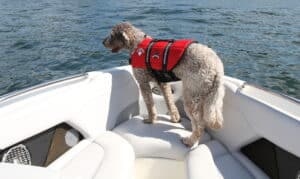The sooner you potty train your puppy the better. You want to establish good habits from the start. And, a dog who has never gone potty in the house will never consider the house a place *to* go potty. I’ve always found the puppies we purchased from actual working farms (NOT puppy farms) were the easiest to house-train.
They only ever wanted to go potty on grass or hay – as they had only ever gone in the barn or outside. They frequently wouldn’t even go potty in a parking lot – we’d need to find grassy areas on the way home for them to go potty. Here are some house training tips that will help – as long as you follow them consistently:
1. Closely supervise your pup while potty training. Do not let your puppy out of your sight while he is loose in your house! Watch him as though you were babysitting a very young child who could/would get in trouble if you didn’t watch them. A puppy is the same as a toddler in this respect. Keep your puppy in a crate to keep him out of trouble when you can’t attentively watch him.
If you see your puppy starting to sniff around, take him outside (or to the selected potty area) right away. If you’d like the potty area to be outside – try to make the area outside from the start; and if for any reason you can’t make the area outside from the start at least make the area near the door. This way when you are ready to house train to outside you can bring your pup outside whenever you see him beginning to sniff around near the door. *When you can’t supervise your un-trained dog, keep him in a crate*. Be sure you have the proper size crate too. Your pup should be able to stand up and turn around – but no larger. If you bring your pup with you to purchase the crate, the store personnel should be able to help you select the correct size. Some people have tied their dog’s leash to their waist while potty training – but you still need to *pay attention*. (I once told my daughter that her puppy potty training problem was that she wasn’t paying enough attention. She phoned one day to tell me that I must be right – her puppy had two accidents that day – both on her foot!)
2. If you find your puppy going potty in the wrong place interrupt him by saying “NO!” in a sharp tone of voice- then immediately take him to the proper place to finish. (If you don’t catch him – you aren’t watching closely enough.) It could help to put the paper towel you clean the mess with where you want him to potty- so that he will have the scent there. Be sure to *thoroughly* clean and de-odorize the area where he pottied in the house. Use special products made for this purpose – or he will go there again. In fact, watch him *extra closely* and/or take him to his potty place when he starts sniffing around those areas.
3. Pick a potty place that is free of distractions. No playing of any kind until the pup has gone potty. Do NOT turn potty time into play time until after he goes potty. When he does go potty give him a treat and then PLAY with him. Reward him lavishly and immediately!
4. Set a schedule. Keeping a routine will help to establish good habits. Control when your puppy eats and drinks. Feed your puppy 3 times a day when you first bring him home (or as your breeder recommends). You can decrease this to one or two times a day as he gets older. Be sure he always has fresh water to drink. Take your puppy to his potty area about once an hour – and always take him to his potty area within 10 minutes after he eats or drinks, wakes up, and after exercise or play. Permit absolutely no playing or distractions until he has ‘done his business’. Once he has gone potty you can begin to take him outside about once an hour for a very young puppy – and extend the time between ‘potty breaks’ as your pup gets older and firmly forms good house training habits. But be sure to *watch your pup carefully* whenever he isn’t either confined or in an ‘OK to potty’ area.
5. Reward your puppy as soon as he does go potty in the appropriate location. Give him a bit of a very tasty special treat. Tell him, “Yes! Good boy!” And play with him! Make the moment he goes potty the moment the fun and good stuff begin. Dogs love good stuff; and they will usually do whatever they need to do to get it. So all you really need to do is to make sure your dog knows what you expect of him – what it takes to get the ‘good stuff’.
This is a lot of work at first until the habits are formed. But really, it is the most effective– and sometimes the only- way that it can be done. Be sure to take your puppy outside as much as possible to increase his opportunity to eliminate outdoors. If he doesn’t go outside do NOT take your eyes off him when you bring him in. Most importantly: lavishly praise, reward, and play with him when he does go outside. With the use of patience, persistence, consistence, and lavish reward – you will both succeed!
Reprinted with permission: www.articlebiz.com





